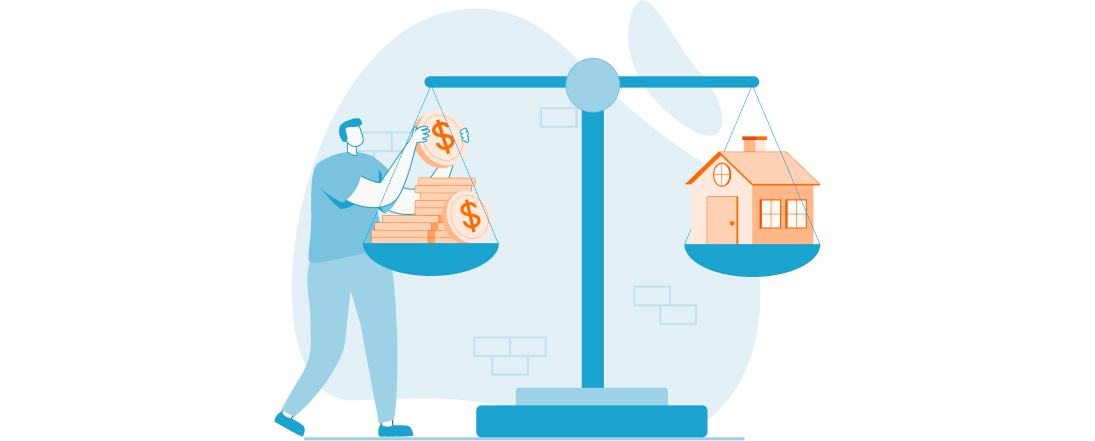Understanding Private Mortgage Insurance

Private mortgage insurance (PMI) is a type of protection that helps protect lenders’ investments but doesn’t protect borrowers against losing their homes if they can’t make their monthly payments. The good news is that most lenders will allow you to drop PMI after meeting certain requirements or reaching a certain point in the life of your loan.
What is private mortgage insurance?
Private mortgage insurance, or PMI, is a type of mortgage insurance you might be required to pay for if you have a conventional, FHA, or Jumbo loan. This type of insurance protects the lender if you default on your loan. When it comes to mortgages and loans, this can get confusing because there’s so much jargon around it—but don’t worry! We’ll explain everything here so that you know exactly what PMI is, who would need it, and when they’d need it.
How much does private mortgage insurance typically cost?
PMI costs can vary depending on your loan, credit score, and the type of home you buy. If you have a less-than-stellar credit history (or no history at all), you may be required to pay PMI for quite some time, even after your home value has increased beyond the original purchase price. PMI rates are usually higher for borrowers with lower credit scores; however, insurers can use non-traditional indicators like rent or income to provide more accurate pricing based on risk factors.
Your lender will use your loan-to-value ratio (LTV) to calculate your monthly premium. Lenders generally require borrowers to have a 20% down payment, but if you still need to save up, they may allow you to make a smaller down payment. In this case, lenders assume that there’s greater risk involved with lending more than 80% of the home’s value since there aren’t many ways to ensure their investment against foreclosure if something goes wrong.
The higher your LTV is—that is, how much debt you’re taking on relative to how much equity exists in your home—the greater the risk for lenders, who then charge more through PMI premiums. It follows that borrowers with lower credit scores will likely face higher rates because they represent higher risks than consumers with good credit scores.
In addition to the factors mentioned above that affect how much PMI costs, it’s also important to note that some lenders may offer different premiums depending on their pricing models or underwriting standards. For example, one lender might charge almost $1.86 per thousand dollars borrowed (0.186%), whereas another lender might charge only $0.58 per thousand dollars borrowed (0.058%).
PMI protects the lender, not you.
On the other hand, private mortgage insurance is a form of insurance paid by the buyer or person refinancing, that protects the lender in case of default, typically used in loan situations in exchange for a smaller down payment or allowance of purchase with a lower credit score.
In essence, think of PMI as the balancing factor for you to get a better deal. Your lender is helping you out by allowing a lower down payment or approving you with a lower credit score – in turn, you’re offering them protection by paying private mortgage insurance (until you have enough equity in the home, which we’ll discuss below).
Is PMI part of your monthly payment?
Yes, PMI is included as part of your monthly mortgage payment. Like taxes and escrow are included in the monthly payment, you’ll see your private mortgage insurance listed on your monthly mortgage bill.
How much will I pay for PMI?
The amount you’ll pay for PMI varies depending on your credit score and the type of home loan you have.
Average Annual PMI Premium
| Your Credit Score | Annual Average Premium as a Percentage of Original Loan Amount |
| 620-639 | 1.86% |
| 640-659 | 1.65% |
| 660-679 | 1.54% |
| 680-699 | 1.21% |
| 700-719 | 0.99% |
| 720-739 | 0.87% |
| 740-759 | 0.70% |
| 760 and above | 0.58% |
How can I pay for my private mortgage insurance?
There are several ways mortgage insurance might be paid, whether to a private mortgage insurance company or a government agency like the FHA:
- Monthly: The most common format, monthly PMI payments come with no upfront premium and are generally lumped in with the overall mortgage payment and paid all at once. They offer plenty of flexibility.
- Single: Some buyers choose a single PMI payment, which can be either refundable or nonrefundable. This amount will sometimes be financed into the loan amount but may also be kept separate. This option does involve an upfront premium.
- Split: Some portion is paid upfront, plus a premium, but a lower monthly renewal amount is also paid.
- Outside party: In some special circumstances, the lender or a separate third party will pay PMI.
What is lender-paid mortgage insurance?
Some lenders offer lender-paid mortgage insurance (LPMI), where the cost of the policy is included in the mortgage interest rate for the life of the loan, or buyers can make a one-time payment to buy out the PMI on the loan.
Do FHA loans have private mortgage insurance?
Your situation will determine if buying mortgage points is a smart move. If you move frequently and might have to sell your home relatively soon after purchasing it, buying points might not be a great option for you. However, it might be a good option if you’re planning to own the home for over five years.
Benefits
Borrowers who choose a federal housing administration (FHA) loan cannot avoid paying PMI. FHA loans are insured by the U.S. Department of Housing and Urban Development (HUD), which means the U.S. government backs them. FHA loans always have PMI, even when the borrower has over 20% equity. This is because FHA loans require a lower down payment, and are considered more risky than conventional loans. The only ways to get rid of PMI on an FHA loan are to:
- Refinance to a different loan type (like conventional)
- Sell the home
- Payoff the loan entirely
FHA loans also require an Upfront Mortgage Insurance Premium to be paid in addition to monthly private mortgage insurance throughout the life of the loan.
Do VA loans have private mortgage insurance?
In short, no. VA loans are guaranteed by the US Department of Veterans Affairs and do not have private mortgage insurance. This is one of the many reasons why VA loans are normally the best option for military veterans that qualify.
How much is PMI on a $300,000 loan?
So how much is private mortgage insurance (PMI) on a $300,000 loan? PMI is typically between 0.5% and 1.5% of the loan amount. That means if you have a 30-year fixed mortgage for $300,000, you could pay between $1,500 and $4,500 per year in private mortgage insurance.
How can you avoid paying private mortgage insurance?
If you’re looking to avoid paying PMI, there are a few ways to do so. The first is simply making a downpayment of 20% or more on your home. This makes it more likely that the lender will offer you a lower interest rate, which will help reduce your monthly payments and keep them within the range of what you can afford.
Another option for military veterans is to a get a VA loan, which allows borrowers to purchase homes with as little as a 0% down payment and no private mortgage insurance (PMI).
- Your loan-to-value ratio (LTV) is below 80%
- Pay a higher interest rate in exchange for lender-paid mortgage insurance (LPMI)
- Get a “piggyback loan” aka an 80-10-10 loan
When does private mortgage insurance go away?
Your private mortgage insurance will go away when:
- Conventional Loans & Jumbo Loans:
- PMI goes away when your LTV drops to 80%. This can happen through your home value increasing, you paying down your loan balance to 80% of the value, or a combination of both. If you pay your balance down to 80% of your original loan amount, your PMI will normally drop off automatically. If it’s a combo between your home value appreciating, and you paying your balance down, you will need to contact your loan servicer and request that they remove your PMI. Each loan servicer is different and some may require an appraisal.
- The other option is to refinance to a conventional loan. If your LTV is below 80%, you won’t have any PMI.
- FHA LOANS:
- You must refinance or sell your home to remove PMI
- VA Loans:
- VA loans never have PMI.



